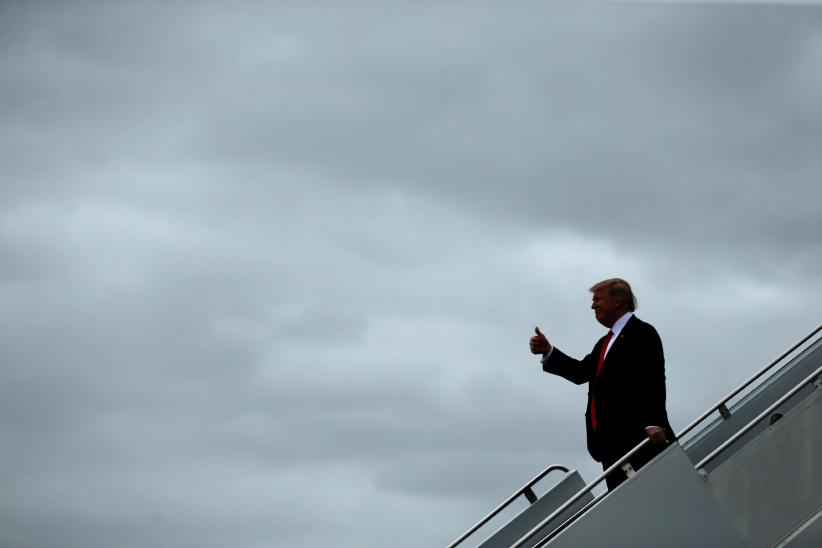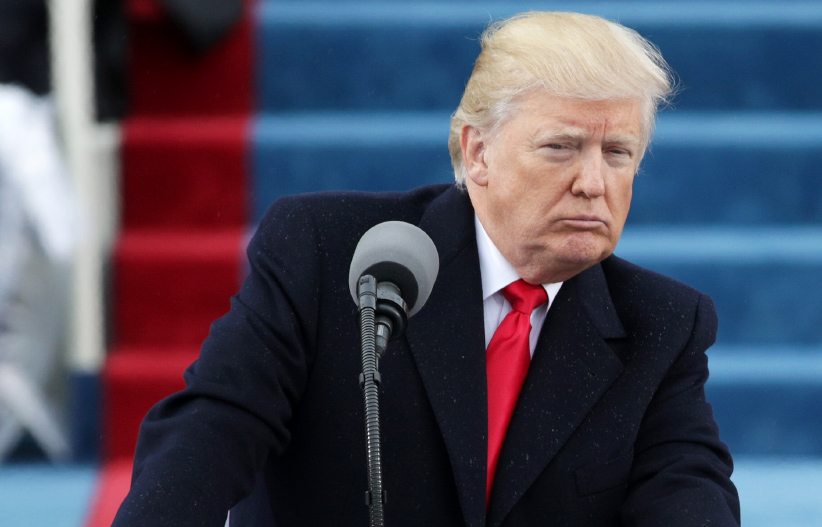How American democracy could slowly fade away
If the world’s oldest democracy comes undone in the 21st century, it won’t be through revolution—it will be through neglect
U.S. President Donald Trump arrives aboard Air Force One at Palm Beach International Airport in West Palm Beach, Florida, U.S. March 3, 2017. (Jonathan Ernst/Reuters)
Share

Democracy tends to be the exception, not the rule. Historically, the form of government that puts the people in charge emerged several times over long periods in fits and starts, sometimes aided by bloody revolution, only to collapse upon itself like a dying star. In its place came empire, feudalist-monarchy, autocracy, or anarchy.
In antiquity, Greek democracy was short-lived and constrained, and the Roman Republic was less an entity centred on “people power” than it was an aristocratic enterprise. The English acceptance of the rule of the many was sluggish to say the least and uncertain of itself more often than not, and the French Revolution quickly gave way to The Terror and then to Napoleon’s monocratic impulses. The fall of the Soviet Union seemed to herald the end of history and the rise of global liberal democracy. It did no such thing.
READ MORE: Donald Trump’s paranoid pedigree
The American experiment with democracy has always seemed remarkable to me because it was both rather abrupt and mostly successful as far as these things go. The Revolution unfolded over the course of several years, from about 1765 until 1783. The Treaty of Paris between Great Britain and the U.S., which ended the Revolutionary War, left a fledgling nation in fine enough shape to emerge as a democracy. And it wasn’t long before the Articles of Confederation, which had stitched the 13 colonies together, was replaced by the Constitution—which fused them. In the decades and centuries that followed, America came to enjoy its status as the apotheosis of government by and for the people, even if such eminence was often betrayed by politics that ranged from dubious to odious.
From the beginning and ever since, American democracy was premised on ideals that were as lofty in theory as they were violated in practice. Consider slavery: Basing a political system on the idea that all men are created equal while keeping millions as property was as plainly inconsistent as it was repugnant. A limited franchise, colonial misadventures that drew independent entities into the American firmament, shameful civil rights abuses, gerrymandered electoral districts aimed at fixing electoral outcomes, the corrosive and grotesque influence of money on elected officials, and the overwhelming influence of special interests over average citizens have all undermined U.S. claims to democratic preeminence. But despite these remarkable shortcomings, there was value in having a state that set the democratic bar high enough that people around the world had something to reach for.
Donald Trump’s election as president is a departure from the democratic ideal that America has embraced since its beginning. Trump is not the cause of the abandonment of this ideal, but the effect. As Harvard professor Pippa Norris notes, the 2011 World Values Survey revealed that a segment of the U.S. population was ready to embrace democratic retrenchment: 44 per cent of non-college graduates agreed that it was “fairly good” or “very good” to have a “strong leader who doesn’t have to bother with Congress and elections.” Translation? Screw your ideals: We just want things to get done.
Democracy in America has been slipping away for some time. As political scientists Martin Gilens and Benjamin Page found in their study of 1,779 policy issues between 1981 and 2002, elites dominate U.S. politics and “the majority does not rule—at least not in the causal sense of actually determining policy outcomes. When a majority of citizens disagrees with economic elites or with organized interest, they generally lose.” Translation? The Onion had it right years ago. Democracy is “A moderately representative plutocracy.”

When you read Gilens and Page alongside the findings from the World Values Survey, Trump’s win starts to make more sense. Donald Trump is what happens when populist nativism gains momentum throughout the world, when gerrymandering is left unchecked, when voter turnout is low in the just the “right” way, when his competition is wildly unpopular, when racists and sexists and xenophobes feel as if they finally have one of their own to vote for, when political polarization reaches toxic levels, and when economic, social, and cultural anxiety mix with runaway elite resentment. He’s the unlikely outcome of a confluence of factors. If you were to rewind the tape and run it again, who knows if it would play out the same way—but that result was more likely in 2016 than in previous decades, and for good reason.
What does this mean for democracy? Perhaps nothing, at least in the sense that the formal system it has become as a form of government might remain in place for the foreseeable future. But even that scenario belies the risk of “everyday authoritarianism” creeping into America. As Tom Pepinsky, a scholar of comparative politics at Cornell, puts it:
“Most Americans conceptualize a hypothetical end of American democracy in Apocalyptic terms. But actually, you usually learn that you are no longer living in a democracy not because The Government Is Taking Away Your Rights, or passing laws that you oppose, or because there is a coup or a quisling. You know that you are no longer living in a democracy because the elections in which you are participating no longer can yield political change.”
To this I would add that you may also know that you are no longer living a democracy because your government isn’t responsive to your preferences, which is already true in the United States insofar as the sorts of policies the country produces tend not to reflect the popular will (replacing the Affordable Care Act with “Trumpcare,” for instance). Now, with Donald Trump, Americans enjoy a president who represents the interests of very few of them and who shows consistent contempt for democratic institutions. This unholy alliance of policy unresponsiveness and disrespect for institutions manifest in Trump has emerged at a time when a significant number of folks either take democracy for granted or seem to be fine with setting aside core elements of it.
The American crisis today is not quite like the house divided against itself that Lincoln warned against as much as it is a house whose foundation has rotted away by several forms of neglect, different in nature but similar in effect. If democracy is lost in the United States, it won’t be with tanks in the streets or a coup in the White House or the rise of an ersatz Berlin Wall. If democracy is lost in the United States, it will be through prolonged neglect that reaches a tipping point at which it produces just enough of what’s already there—say, elections that offer the illusion of representative and responsive democracy—that any honest observer evaluating the republic will be unable to recognize any trace of the ideal on which the country was founded. The process is already well underway.
David Moscrop is a political scientist and a writer. He’s currently working on a book about why we make bad political decisions and how we can make better ones. He’s at @david_moscrop on Twitter. He lives in Vancouver.